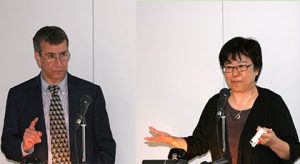
Audio
Download
Veranstaltungsort
Deutsches Institut für Japanstudien
Jochi Kioizaka Bldg. 2F
7-1 Kioicho, Chiyoda-ku
Tokyo 102-0094, Japan
Tel: 03 – 3222 5198, Fax: 03 – 3222 5420
Zugang
Anmeldung
The talk by Professor Garon will be followed by comments by Professor Koshiro before the floor will be opened to the audience for a Q&A session. The event will be held in English. It will be followed by a small reception. Admission is free, registration is required at forum@dijtokyo.org
Five Things You'd Want to Know in Explaining Japan's Surrender in 1945
2. Juni 2016 / 18:30 - 20:00 Uhr
Sheldon Garon, Princeton University
Yukiko Koshiro, Nihon University
To most Americans, it is perfectly obvious that the two atomic bombs ended World War II. Yet at least four other developments helped persuade Japanese leaders to surrender. The Soviet Union’s entry into the war against Japan on August 8 may have been more decisive, some historians argue. However, the other three factors are rarely discussed. The Allied blockade increasingly deprived the Japanese home front of food and fuel. In its final phase called “Operation Starvation”, the U.S. aerial mining campaign stopped nearly all food imports, resulting in widespread malnutrition. Nor have historians fully considered the expansion of the U.S. firebombing campaign to nearly 60 small and medium cities during summer 1945. Bombing and food shortages led millions to flee the cities, crippling Japan’s capacity to wage total war. Finally, Japanese officials and industrialists closely followed the recent defeat of Nazi Germany, which had fought to the finish. Influential elites passionately wished to avoid a similar Allied invasion, and they pressed top leaders to end the war before Japan’s infrastructure and its people were obliterated.
Sheldon Garon is Nissan Professor of History and East Asian Studies at Princeton University. A specialist in modern Japanese history, he also writes transnational history that spotlights the flow of ideas and institutions between Japan, Europe, and the United States ― most recently in Beyond Our Means: Why America Spends While the World Saves (2012). His current project is “When Home Fronts Became Battlefields: A Transnational History of Japan, Germany, and Britain in World War II”. Previous publications include Molding Japanese Minds: The State in Everyday Life (1997) and The State and Labor in Modern Japan (1987).
Yukiko Koshiro is Professor in the Nihon University College of International Relations. She is the author of Trans-Pacific Racisms and the U.S. Occupation of Japan (1999), winner of the Masayoshi Ohira Memorial Prize. Her latest book Imperial Eclipse Japan’s Strategic Thinking about Continental Asia before August 1945 (2013) studies different Japanese attitudes towards the Soviet Union, China, Korea and the US from the pre- to the post-World War Two era. The book was published in Japanese as 『1945予定された敗戦』by Jinbun Shoin in 2015. She has published extensively on different aspects of World War Two and the US occupation of Japan.